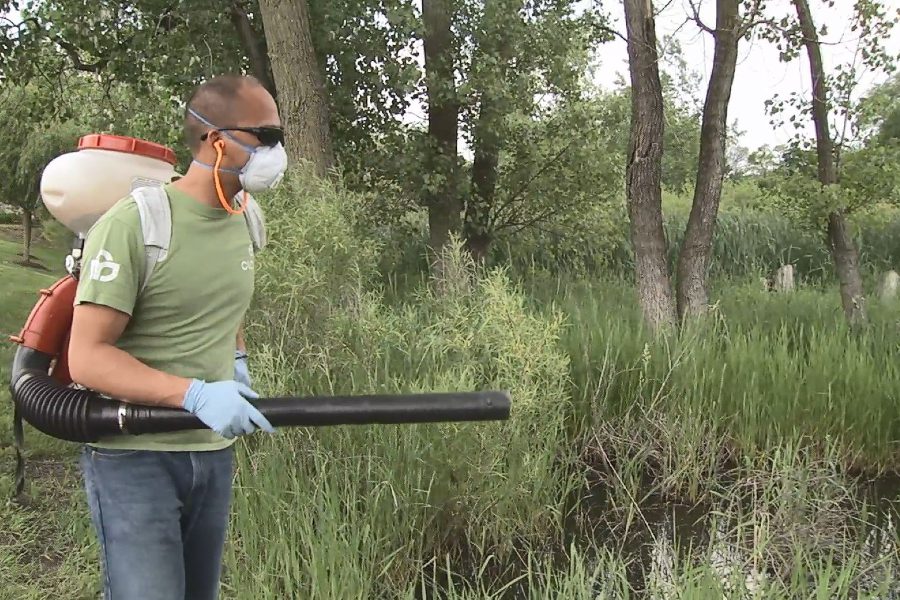COVID-19 and Public Health Mosquito Control

No products in the Quote Basket.
The impacts of COVID-19 and its subsequent variants were an obstacle that every mosquito control program needed to navigate. And for many, its effects are ongoing.
In nearly all jurisdictions, mosquito control is considered an essential public health service and therefore must maintain operations even during challenging times. But how do you maintain operational continuity under social distancing guidelines, shelter-in-place orders or reduced staffing?
As part of our work with mosquito abatement districts across the United States, Clarke was able to be on the forefront of public health mosquito control operations – and to learn how to best approach and conduct operations as close to usual as possible while also leaping ever-emerging hurdles.
Below, you will find a comprehensive guide to maintaining business operations amid COVID-19 regulations and stipulations, including tactics for community engagement, trends for service continuity, the benefits of extended control products and ways to further utilize application equipment for disinfection.
During time periods when people are close to home, early season field work such as inspecting breeding sites, larviciding and trapping/surveillance will be more visible than usual in communities. So be ready to engage!
The Metropolitan Mosquito Control District, serving the greater Minneapolis/St. Paul, Minnesota area, worked with their local CBS station to feature how their program operated under COVID-19 restrictions. They stressed the importance of staff protection and prioritizing their work, while reinforcing the simple but highly effective actions residents can take to remove standing water and eliminate potential breeding sites around their properties.
See a copy of the article and news clip here. This is a great example of outreach that any mosquito control program can do with their local media partners.
Download this article in PDF form.
PROVIDING MOSQUITO CONTROL SERVICE CONTINUITY DURING COVID-19
Mosquito control programs from coast-to-coast have shared how they are continuing work as an essential public health service, while protecting the health and safety of their staff members. Here’s a summary of what we’ve learned:

Four trends for mitigating COVID-19 impacts on mosquito control operations are emerging as mosquito control programs adjust their operational protocols:
![]() Although there are certainly periods of time when treatments and applications will be low, rising temperatures increase the demand for control applications. Mosquito control abatement districts are managing applications by:
Although there are certainly periods of time when treatments and applications will be low, rising temperatures increase the demand for control applications. Mosquito control abatement districts are managing applications by:
![]() Here are a few ways mosquito control programs are managing scheduling for their workforce of essential public health workers during COVID-19.
Here are a few ways mosquito control programs are managing scheduling for their workforce of essential public health workers during COVID-19.
Download the article in PDF format.
Control programs often turn to larvicides to get ahead of early season population spikes.
Routinely hitting known breeding sites with single-brood larvicides is typically the control method of choice for early season population suppression. Temporary water sources are common in the spring, and when you time applications right, single-brood larvicides can do an excellent job at managing synchronous brood hatch offs. But under COVID-19 operating conditions, programs are short on staff, trying to limit coworker exposure and generally looking for ways to be more efficient. And so, some programs are considering a switch to residual larvicides this spring.
Mosquito control programs are reporting larvicide applications by air may make sense to them given the aforementioned conditions. Compared to ground treatments, aerial applications would allow them to:
Download this article in PDF format.
We have seen the photos from around the world of outdoor fogging with disinfectants. But is worthwhile? With staffing resources at a premium, think twice about how to go about with outdoor disinfecting.
Prioritize where you are disinfecting outdoors. Focus on high touch and high trafficked public areas.
In a study reviewed in the New England Journal of Medicine, the SARS-CoV-2 virus that causes Covid-19 only lasts in the air up to three hours. Thus, ultra-low volume (ULV) ‘fogging’ would be very inefficient at reaching and controlling live virus. By comparison, the virus survives on hard surfaces such as stainless steel and plastic two to three days.
As noted in a recent Science Magazine article “Does disinfecting surfaces really prevent the spread of coronavirus?” people don’t lick or touch sidewalks, steps or roads. So wide area treatments of open public spaces should take a second seat to high-touch surfaces such as railings, doors, benches, playground equipment, tables and chairs.
A gas-powered backpack applicator is an ideal means of treating these surfaces. Applicators such as the Clarke Guardsman ULV Backpack Sprayer provides true ULV droplets that efficiently and effectively apply disinfectants to targeted hard surfaces. Click here for a list of EPA listed disinfectants.
Download this article in PDF format.
Is mosquito control considered an essential service during Shelter-in-Place orders?
Yes! Mosquito control is considered an essential public health service during Shelter-in-Place orders. Public Health mosquito control programs help mitigate the impact and spread of vector borne diseases and illness. Clarke’s mosquito control products, equipment and service businesses remain fully operational. Read more about this here.
For more information about the role of public health mosquito control in the U.S., see the Association of State and Territorial Health Organization’s (ASTHO) Public Health Confronts the Mosquito and National Association of County and City Health Officials (NACCHO) Capabilities Based Framework for Mosquito Control in the U.S.
Can mosquitoes transmit coronavirus?
No! The World Health Organization (WHO) and the Center for Disease Control (CDC) concur, mosquitoes do not transmit coronavirus. Read more here.
Sign up to get the latest news and updates from Clarke.